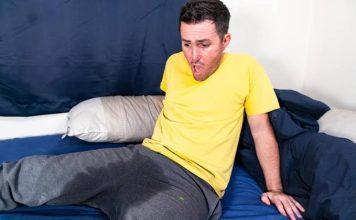Unintentional release of urine during sleep, known as adult bedwetting, may indicate a serious medical issue like bladder or prostate cancer, or be a side effect of medications that require immediate medical attention, according to doctors.
While uncommon in adults, nocturnal enuresis should be investigated to prevent potential health risks. Mayo Clinic defines this as the involuntary passing of urine while asleep beyond the age when nighttime dryness is expected.
Medical experts also point out that bedwetting in adults may be caused by conditions affecting urine storage, such as bladder and prostate cancers. Brain and spinal diseases like seizure disorders, multiple sclerosis, or Parkinson’s disease can also contribute to this issue.
Dr. Chidumeje Okafor, a Family Physician, emphasizes that adult bedwetting can be emotionally distressing and impact self-esteem. He explains that it can be categorized as either secondary, where it resurfaces after a period of dryness, or functional, where there was no history of bedwetting in childhood.
He included “Enuresis can be functional, which means having involuntary passing of urine in adulthood when the person should have stopped in the presence of no obvious deformity.”
Discussing the Causes , he mentioned “Let me start from the head and that is the brain. The brain produces a hormone called anti-diuretic hormone which is responsible for the reabsorption of water in the body.
“Antidiuretic hormone helps regulate the amount of water in your body. It works to control the amount of water your kidneys reabsorb as they filter out waste from the blood.
“That means that in any water you drink, the body through the hormone ensures everything is not urinated. So, the hormone reduces your urine.
“So, if there is any damage to the brain that leads to the reduction of this hormone that controls water and its reabsorption, there will be excessive urine production, meaning that you will be urinating even on the bed as an adult.”
According to his explanation, bed-wetting problems in individuals could be a result of insufficient production of a specific hormone by the body or an inadequate response from the kidneys to this hormone.
Okafor further pointed out that diabetes insipidus can influence ADH levels, leading to an increased volume of urine being produced. In addition, he observed that the bladder’s inability to retain a sufficient amount of urine, coupled with limited capacity, can result in urine leakage.
Moreover, Okafor mentioned that individuals with overactive bladders, particularly females, may experience involuntary contraction of the bladder muscles when they are not prepared to urinate.
“In an overactive bladder, these muscles squeeze too often or at the wrong times and make you urinate. Also, some drugs you take can irritate your bladder, such as sleeping pills or antipsychotic drugs. These will also make you wet the bed.”
Regarding next steps, he recommended that individuals dealing with this medical condition should consult a doctor for a thorough evaluation to identify the underlying cause of the secondary enuresis.
“Counselling in the form of motivational therapy is needed because the thought of bedwetting as an adult is devastating and it might proceed to psychological trauma and depression.
“Also, alarm therapy can help. That is setting an alarm for the person to wake up regularly to urinate. However, where these failed, the use of drugs to act as Anti-diuretic substitutes to regulate the water in the body and reduce frequent urination will be required,” Okafor included
According to Dr. Michael Ogah, a Nigerian Urologist based in Australia, bedwetting may be attributed to issues affecting the body’s capacity to store and retain urine. Conditions like bladder cancer and prostate cancer were mentioned as possible causes. Additionally, disorders of the brain and spine, such as seizure disorders, multiple sclerosis, and Parkinson’s disease, were noted to be potential factors contributing to bedwetting.
In terms of addressing the issue, Dr. Ogah recommended making changes to one’s daily and nightly routines. This includes refraining from consuming fluids before bedtime to reduce urine production. He also advised against the intake of caffeine and alcohol, as they can potentially stimulate the bladder and exacerbate the problem.
“Set an alarm clock to wake you up at regular intervals during the night. Medicine like desmopressin reduces the amount of urine your kidneys make.
“OnabotulinumtoxinA can be injected into the bladder to relax the muscles. There might be a detrusor myectomy, which is a major operation that treats an overactive bladder, where your surgeon removes part or all of the muscles around your bladder to stop them from contracting at the wrong times.”
In a research study conducted by Hamed Akhavizadegan and colleagues, which was published in the National Library of Medicine and titled ‘A comprehensive review of adult enuresis,’ it was stated that the ability to retain urine throughout the night is considered a developmental neuro-motor skill related to bladder function.
The authors noted that individuals with Nocturnal Enuresis (NE) often experience a disconnect between bladder compliance, sphincter efficiency, and nighttime urine production, leading to a lack of awareness of the need to avoid voiding.
The study concluded that many adults suffering from NE may be affected psychologically, as the condition is viewed as a symptom of urinary tract disorders or systemic diseases.
“It requires a standard evaluation consisting of history and physical examination, urinalysis, and when indicated, urinary ultrasonography, urine flow rate, frequency volume chart, urodynamic study, and cystoscopy.
“It is recommended that general practitioners refer adults with NE to urologists due to its complexity. However, many patients benefit from long-term desmopressin. Anticholinergics can add benefit even in the absence of overactive bladder symptoms.”
